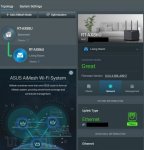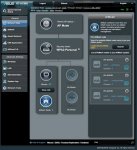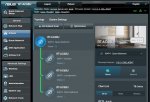RC2-8 Has so far resolved my initial issues. Ai-Mesh Ethernet backhaul and uplink both are reporting correctly over my unmanaged switch. Everything seems much more stable, the flash of the RT-AX86U (node) was without incident. All devices were hard reset followed by a factory reset then configured from scratch after firmware installation.
RT-AX88U (Router) Wired speed is 925Mbps down, 935Mbps up, Wireless speeds to an RT-AX82U configured as a media bridge are 777Mbps Down, 792Mbps up, with 1ms extra latency difference from wired results
I have not tested the inclusion of the guest networks over the Ai-Mesh yet, but will get to it over the next week. Overall very good results!
Attachments
Last edited:




